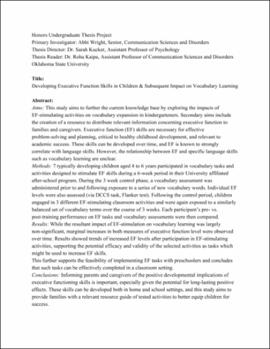| dc.contributor.author | Wright, Abbi | |
| dc.date.accessioned | 2021-04-20T13:53:40Z | |
| dc.date.available | 2021-04-20T13:53:40Z | |
| dc.date.issued | 2020-04-28 | |
| dc.identifier | oksd_wright_HT_2020 | |
| dc.identifier.uri | https://hdl.handle.net/11244/329475 | |
| dc.description.abstract | Aims: This study aims to further the current knowledge base by exploring the impacts of EF-stimulating activities on vocabulary expansion in kindergarteners. Secondary aims include the creation of a resource to distribute relevant information concerning executive function to families and caregivers. Executive function (EF) skills are necessary for effective problem-solving and planning, critical to healthy childhood development, and relevant to academic success. These skills can be developed over time, and EF is known to strongly correlate with language skills. However, the relationship between EF and specific language skills such as vocabulary learning are unclear. | |
| dc.description.abstract | Methods: 7 typically developing children aged 4 to 6 years participated in vocabulary tasks and activities designed to stimulate EF skills during a 6-week period in their University affiliated after-school program. During the 3 week control phase, a vocabulary assessment was administered prior to and following exposure to a series of new vocabulary words. Individual EF levels were also assessed (via DCCS task, Flanker test). Following the control period, children engaged in 3 different EF-stimulating classroom activities and were again exposed to a similarly balanced set of vocabulary terms over the course of 3 weeks. Each participant's pre- vs. post-training performance on EF tasks and vocabulary assessments were then compared. | |
| dc.description.abstract | Results: While the resultant impact of EF-stimulation on vocabulary learning was largely non-significant, marginal increases in both measures of executive function level were observed over time. Results showed trends of increased EF levels after participation in EF-stimulating activities, supporting the potential efficacy and validity of the selected activities as tasks which might be used to increase EF skills. | |
| dc.description.abstract | This further supports the feasibility of implementing EF tasks with preschoolers and concludes that such tasks can be effectively completed in a classroom setting. | |
| dc.description.abstract | Conclusions: Informing parents and caregivers of the positive developmental implications of executive functioning skills is important, especially given the potential for long-lasting positive effects. These skills can be developed both in home and school settings, and this study aims to provide families with a relevant resource guide of tested activities to better equip children for success. | |
| dc.format | application/pdf | |
| dc.language | en_US | |
| dc.rights | Copyright is held by the author who has granted the Oklahoma State University Library the non-exclusive right to share this material in its institutional repository. Contact Digital Library Services at lib-dls@okstate.edu or 405-744-9161 for the permission policy on the use, reproduction or distribution of this material. | |
| dc.title | Developing executive function skills in children and subsequent impact on vocabulary learning | |
| osu.filename | oksd_wright_HT_2020.pdf | |
| osu.accesstype | Open Access | |
| dc.type.genre | Honors Thesis | |
| dc.type.material | Text | |
| dc.contributor.director | Kucker, Sarah | |
| dc.contributor.facultyreader | Kaipa, Roha | |
| thesis.degree.discipline | Communication Sciences and Disorders | |
| thesis.degree.grantor | Oklahoma State University | |
